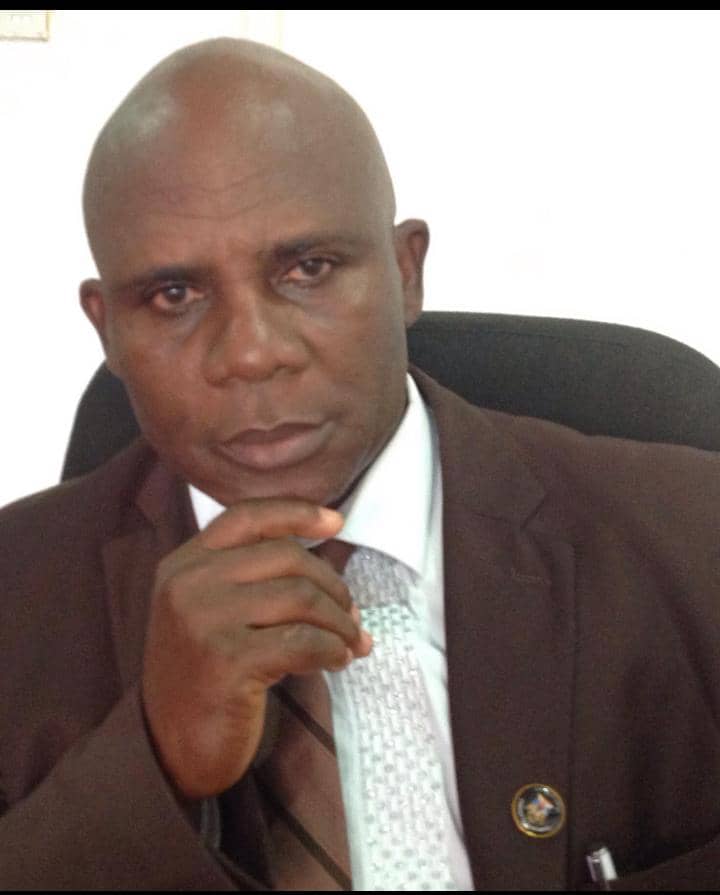MEET FRANK OSHANUGOR
(GUEST WRITER)

By Ben Okezie
When politics is not handled satisfactorily so that a peaceful enviroment subsists, then security becomes a problem for every citizen.
That is why it is expedient for managers or the players of politics to always be very conscious of every step and activity they carry out.
They ought to be guided to promote not only harmony in society but also bring and circulate dividends of the end product of politics, which is democracy.

Therefore, when politics is played satisfactorily, it brings dividends of democracy, which include stable, condusive and progressive society that is protected by effective and efficient security. In other words, if politicians fail to practice politics properly, they inadvertently invite insecurity and this impedes progress and development in the society.
Do you see a society where there is insecurity? It automatically suggests that democracy has been tampered with and politicians are playing the game in a very dirty way.
Security ought to be under the authority of politicians for democracy to thrive but when the opposite becomes the norm, then insecurity is created and there is chaos; destruction and death of innocent citizens would be the end result.
Since lndependence, Nigeria has been dilly-dallying with bad governance, which, unfortunately, has not helped in the stabilisation of the country’s democracy. It has also created the loophole for ‘Crazy’ military adventurers to truncate institutionalised democracy.
Despite the ugly past that cast a dark cloud over a democratic system that we unanimously adopted in 1960, the pendulum of instability continues to swing between the evident indecisions of the political authorities and the masses who are at the receiving end. And the painful results would eventually tarnish the democratic image of the country despite all the efforts.

In 1999, when a former military leader, Gen. Olusegun Obasanjo (retd.) was elected as President, Nigeria’s shaky democracy got some stability. Although democracatic governance seems stable after two decades, there are still gaps to cover, with no enduring political structures in place.
Yet it seems politicians are once again trying to throw a spanner in the works by their actions and utterances. These actions tend to create an unstable political atmosphere. Today, politicians pervade every security agency, creating unwholesome situations.
They want to be part of recruitment exercises; they want to influence the promotions and postings of security agents. They dictate who should be posted to them as orderlies.
Politicians interfere with electoral processes and create a chaotic, violent voting enviroment that usually results in an insecure atmosphere.
Politicians no longer know where to draw the line between them and security agencies, instead they throw caution to the wind and meddle with the activities of security agencies, security leaders and their operations.

Once, President Goodluck Jonathan had alledged that some people were meddling with the internal security of the country. Of course, they could not have been anyone but politicians.
Do not link this narrative with the advocacy that governors, as the chief security officers of their states, should be fully in charge of their states’ security architecture, unlike what is obtainable and practiced around the world. Why is it that we copy ideas partially and implement them to suit our whims and caprices, instead of the overall interest of the nation?
The expatriates that brought uniform security to Nigeria started by establishing a decentralised system.
Why have the governors, whose terrains have been encroached on, been going cap in hand, begging the Federal Government to intervene by deploying security agents from the federal pool, when they could have effectively strategized with the state security commanders under their authority to tackle insecurity in their respective states, before it grows wings to what we are experiencing today?

This is the reason many are questioning issues concerning the politicisation of security.
According to an lgbo figure of speech, which literarily states “How did water enter the thick Okro soup?” The thickness of the “Okro soup” can be likened to the unity of the security services. Unfortunately, politicians have over the years compromised security, and have many times been linked with the polarisation, destabilisation and factionalisation of our once united security institutions.
What we have currently is a non-inclusive federal policy that has alienated some parts of the country whenever there are appointments.
This breeds an insecure environment and perceptions, as being played out in the country today, with agitations for secession spreading like wildfire. Oftentimes, it is the careless decisions of politicians that are usually tainted by ethnic, religious or selfish interests, ignoring the corporate interest of the country when carrying out official assignments, that cause trouble.
We cannot deny the fact that such inconsiderate policies must have given birth to many of the pockets of insecurity that are weighing down the country today. For instance, those in the Niger Delta are still not impressed with the sharing formula of the revenue from oil being extracted from their soil, yet other parts of the country hardly contribute to the national coffers from what is extracted from their own soil.
It is the same with all those agitating about marginalisation and non-inclusiveness where appointments are either ethnicized or based on religious affiliation, instead of practising Federal Character as enshrined in the Constitution.
Simply summarized, people want equal sharing, equal and equitable representation at state and federal levels of government. That’s what makes a united country.
These bad political behaviours are being entrenched by politicians. These negative policies affect national unity and breed tension that eventually creates insecurity. A close analysis of one of the causes of the birth of the Boko Haram sect points at the political instigation of the security agency to undermine the human rights of supposedly ordinary Muslim citizens of Borno State without full consideration of their interests, which resulted in the unecessary killing of their leader, Mohammed Yusuf, on July 20, 2009.

It is expedient that, as the country marches once again towards solidifying the foundation of our democracy, politicians should be extremely careful of their dispositions and utterances, so that the country can enjoy dividends of democracy via credible and reliable elections devoid of any security presence.

